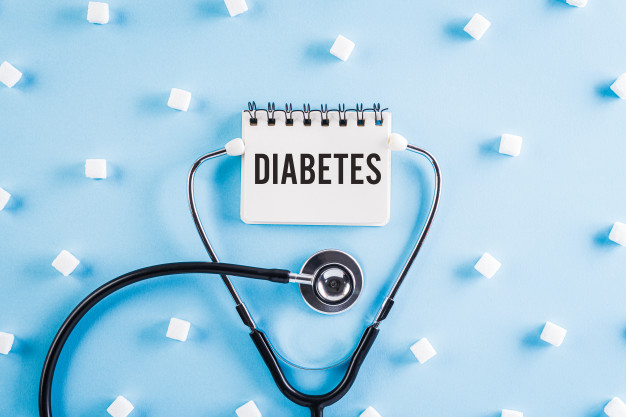Uncontrolled Diabetes: The Effective Ways to Take Control
Nowadays, many people are living with diabetes—some are aware of their condition, while others may not be. Without proper care and treatment, diabetes can lead to serious complications in various parts of the body. However, with regular screening, appropriate and continuous treatment, the patients can maintain a good quality of life and reduce the risk of complications.
 Dr. Kaset Chimplee, our endocrinologist at Bangkok Hospital Hua Hin, explains that diabetes mellitus is a condition in which the body has higher-than-normal blood sugar levels. This happens when the body either lacks insulin or cannot use insulin effectively, leading to a disruption in the body’s metabolic processes—particularly the metabolism of carbohydrates. In Thailand, epidemiologic studies show that about 12% of people of adult age have been diagnosed with diabetes, and there are still who are unaware that they have this condition.
Dr. Kaset Chimplee, our endocrinologist at Bangkok Hospital Hua Hin, explains that diabetes mellitus is a condition in which the body has higher-than-normal blood sugar levels. This happens when the body either lacks insulin or cannot use insulin effectively, leading to a disruption in the body’s metabolic processes—particularly the metabolism of carbohydrates. In Thailand, epidemiologic studies show that about 12% of people of adult age have been diagnosed with diabetes, and there are still who are unaware that they have this condition.
 The causes of diabetes include both genetic and lifestyle factors. People with a family history of diabetes—especially if their father or mother has the condition—are at higher risk. Other contributing factors include unhealthy eating habits, obesity, high blood lipid levels, lack of exercise, stress, and the use of certain medications.
The symptoms of diabetes often start with frequent thirst and urination, such as waking up often at night to urinate. Other signs include feeling tired easily, unexplained weight loss, slow-healing wounds, blurry vision, and itchy skin.
Diabetes is diagnosed through a blood test to check fasting blood sugar levels or by measuring the hemoglobin A1c (HbA1c), which shows the average blood sugar level over the past three months.
The causes of diabetes include both genetic and lifestyle factors. People with a family history of diabetes—especially if their father or mother has the condition—are at higher risk. Other contributing factors include unhealthy eating habits, obesity, high blood lipid levels, lack of exercise, stress, and the use of certain medications.
The symptoms of diabetes often start with frequent thirst and urination, such as waking up often at night to urinate. Other signs include feeling tired easily, unexplained weight loss, slow-healing wounds, blurry vision, and itchy skin.
Diabetes is diagnosed through a blood test to check fasting blood sugar levels or by measuring the hemoglobin A1c (HbA1c), which shows the average blood sugar level over the past three months.
 Diabetes treatment includes four main approaches:
Diabetes treatment includes four main approaches:
 What to Do if Diabetes is Uncontrolled? Some patients may still have high blood sugar levels even after taking medication or using insulin. This could be due to long-term diabetes with insufficient self-insulin production that has caused damage to the body’s systems. Other causes include poor diet, lack of exercise, an unhealthy lifestyle or environment, or stopping medication without consulting a doctor. When diabetes is not well-controlled, it increases the risk of complications such as heart disease, stroke, kidney failure, retinal damage, or chronic foot ulcers.
Recommendations for People with Diabetes
What to Do if Diabetes is Uncontrolled? Some patients may still have high blood sugar levels even after taking medication or using insulin. This could be due to long-term diabetes with insufficient self-insulin production that has caused damage to the body’s systems. Other causes include poor diet, lack of exercise, an unhealthy lifestyle or environment, or stopping medication without consulting a doctor. When diabetes is not well-controlled, it increases the risk of complications such as heart disease, stroke, kidney failure, retinal damage, or chronic foot ulcers.
Recommendations for People with Diabetes
 Dr. Kaset Chimplee, our endocrinologist at Bangkok Hospital Hua Hin, explains that diabetes mellitus is a condition in which the body has higher-than-normal blood sugar levels. This happens when the body either lacks insulin or cannot use insulin effectively, leading to a disruption in the body’s metabolic processes—particularly the metabolism of carbohydrates. In Thailand, epidemiologic studies show that about 12% of people of adult age have been diagnosed with diabetes, and there are still who are unaware that they have this condition.
Dr. Kaset Chimplee, our endocrinologist at Bangkok Hospital Hua Hin, explains that diabetes mellitus is a condition in which the body has higher-than-normal blood sugar levels. This happens when the body either lacks insulin or cannot use insulin effectively, leading to a disruption in the body’s metabolic processes—particularly the metabolism of carbohydrates. In Thailand, epidemiologic studies show that about 12% of people of adult age have been diagnosed with diabetes, and there are still who are unaware that they have this condition.
 The causes of diabetes include both genetic and lifestyle factors. People with a family history of diabetes—especially if their father or mother has the condition—are at higher risk. Other contributing factors include unhealthy eating habits, obesity, high blood lipid levels, lack of exercise, stress, and the use of certain medications.
The symptoms of diabetes often start with frequent thirst and urination, such as waking up often at night to urinate. Other signs include feeling tired easily, unexplained weight loss, slow-healing wounds, blurry vision, and itchy skin.
Diabetes is diagnosed through a blood test to check fasting blood sugar levels or by measuring the hemoglobin A1c (HbA1c), which shows the average blood sugar level over the past three months.
The causes of diabetes include both genetic and lifestyle factors. People with a family history of diabetes—especially if their father or mother has the condition—are at higher risk. Other contributing factors include unhealthy eating habits, obesity, high blood lipid levels, lack of exercise, stress, and the use of certain medications.
The symptoms of diabetes often start with frequent thirst and urination, such as waking up often at night to urinate. Other signs include feeling tired easily, unexplained weight loss, slow-healing wounds, blurry vision, and itchy skin.
Diabetes is diagnosed through a blood test to check fasting blood sugar levels or by measuring the hemoglobin A1c (HbA1c), which shows the average blood sugar level over the past three months.
 Diabetes treatment includes four main approaches:
Diabetes treatment includes four main approaches:
- Diabetic Education: Patients should understand the condition to manage it effectively. Learning about the causes, symptoms, and ways to control blood sugar levels is essential. While diabetes cannot be cured, it can be managed to keep blood sugar within a healthy range and reduce the risk of complications.
- Lifestyle Modification: Managing stress, getting enough rest, weight control, and healthy diet are essential. This includes reducing sugar, fats, and carbohydrates, while focusing on vegetables and protein. Regular exercise, especially aerobic exercises such as walking, swimming, or cycling for at least 150 minutes per week, help control blood sugar.
- Medication: Doctors may prescribe medication to help keep blood sugar levels stable. These could be oral pills or injections, depending on the type of diabetes and the patient’s responds.
- Insulin therapy: For patients who cannot control their blood sugar with oral medication alone or have very high blood sugar levels, insulin injections are necessary to help the body effectively utilize blood sugar, and prevent acute serious elevation of blood sugar.
 What to Do if Diabetes is Uncontrolled? Some patients may still have high blood sugar levels even after taking medication or using insulin. This could be due to long-term diabetes with insufficient self-insulin production that has caused damage to the body’s systems. Other causes include poor diet, lack of exercise, an unhealthy lifestyle or environment, or stopping medication without consulting a doctor. When diabetes is not well-controlled, it increases the risk of complications such as heart disease, stroke, kidney failure, retinal damage, or chronic foot ulcers.
Recommendations for People with Diabetes
What to Do if Diabetes is Uncontrolled? Some patients may still have high blood sugar levels even after taking medication or using insulin. This could be due to long-term diabetes with insufficient self-insulin production that has caused damage to the body’s systems. Other causes include poor diet, lack of exercise, an unhealthy lifestyle or environment, or stopping medication without consulting a doctor. When diabetes is not well-controlled, it increases the risk of complications such as heart disease, stroke, kidney failure, retinal damage, or chronic foot ulcers.
Recommendations for People with Diabetes
- Regularly visit your doctor to monitor your condition and adjust treatment, especially for screening complications of diabetes, such as diabetic retinopathy, diabetic nephropathy, and coronary artery disease.
- Follow the doctor’s dietary and exercise recommendations.
- Do not stop or adjust medication without consulting your doctor.
- If you are at risk, such as having a family history of diabetes, being overweight, or having high cholesterol, you should have an annual health check-up or a blood sugar test to detect early signs of diabetes and prevent disease progression.